Slotting in the best graphics card is the most important part of any PC build if gaming is your number one priority. The GPU (graphics processing unit) is the pounding heart at the center of your machine that handles all the rendering intensive tasks; it takes instructions from games and creates the magnificent digital worlds we inhabit and all the characters that populate them. And right now is a great time to be shopping for an upgrade - the holiday season has brought a raft of deals on video cards, like the MSI GeForce RTX 2080 with a copy of Battlefield 5 for $679 at Walmart. That's all the way down from the list price of $909, and it comes with a copy of the game best suited to showing off Nvidia's flashy new ray-tracing technology. It's also our pick for the best graphics card currently available, sitting at number one on our thoroughly vetted list.
But there is a world of options available when you're shopping for the best graphics card, so which one will best suit you, and how do you decide? One of the most important, and easily the most obvious considerations is price - establish ahead of time what you're comfortable paying to upgrade and plan accordingly. Beyond that, though, there are a number of factors. Are you looking to future proof your machine, so that an upfront expense now means you won't have to worry about a GPU upgrade for years to come? In that case, the 20-series from Nvidia is probably for you. If, on the other hand, you just want something to bridge you from now until the next generation of consoles, the big drivers in how much new games push hardware, you should definitely consider a more affordable option like a 1050 or even a 1070 Ti. A mid-level 10-series card will easily see you through the 1080p generation of gaming and then you can choose how you want to upgrade when we've got a better handle on wha t the new consoles are packing (and when prices on the current GPU offerings have hopefully dipped some).
Regardless of what you choose, we've got you covered, with a comprehensive list of the best cards money can buy right now. Of course, if you want a complete PC gaming rig, check out our guide to buying the best gaming PC. If you're not looking to build a PC, here are the best gaming laptops.
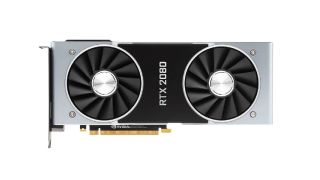
The best graphics card for performance at a (semi-)reasonable price
GPU Cores: 2,944 | Base Clock: 1,515MHz | Boost Clock: 1,800MHz | GFLOPS: 10,958 | Memory: 8GB GDDR6 | Memory Clock: 14Gbps | Memory Bandwidth: 448GB/s
Incredible performance
Crushes 4K with ease
Very limited application of ray-tracing
Expensive
The best card on the market now in terms of performance and price. While the 2080 is still an expensive proposition, the crypto-mining craze has abated somewhat and it's finally possible to find the Founders Edition at the listed MSRP, $799 (or cheaper). While the step-up version, the 2080 Ti, is more powerful, the additional $400 aren't worth it for a relatively marginal increase in computer power (between 10 and 30 percent), especially considering the relatively limited use cases for ray tracing that exist at the moment.
While Battlefield V looks great with ray tracing enabled (and will reportedly perform 50% better after the recently announced patch), it's one of an extremely limited field of games currently taking advantage of the technology. As more games that exploit ray tracing make their way into the wild and the Ti's price declines it may look like the stronger value proposition, but right now the 2080 is king of cards.
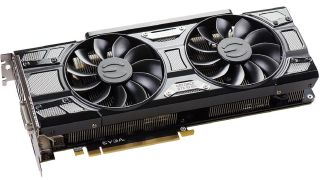
An excellent balance of performance and price
GPU Cores: 2,432 | Base Clock: 1,607MHz | Boost Clock: 1,683MHz | GFLOPS: 8,873 | Memory: 8GB GDDR5 | Memory Clock: 8Gbps | Memory Bandwidth: 256GB/s
Competitively priced high performance
Fills a mid-range gap in Nvidia's product line
Supply issues
The 1070 Ti, another iteration on the now prolific Pascal, is one of the best mid-range cards on the market. If you're looking for a card to power games at 1440p resolution and that can easily handle VR, and aren't looking for the blistering performance of cards hundreds of dollars more expensive, the 1070 Ti admirably balances performance and cost.
Approaching the performance levels of the base 1080 for significantly less cost, the 1070 Ti is a granular answer to the challenge of AMD's Vega line. And as with the 1080 Ti, the upcoming launch of the 2000 series promises to depress prices in the next few months.
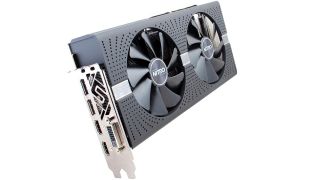
GPU Cores: 2,304 | Base Clock: 1,257MHz | Boost Clock: 1,340MHz | GFLOPS: 6,175 | Memory: 8GB GDDR5 | Memory Clock: 8 GT/s | Memory Bandwidth: 256GB/s
Excellent price and availability
Great match for current games
Starting to show its age
If you have yet to make the leap to a 4K display, spending a tremendous amount of money on an overpowered GPU may seem like an act of excessive decadence. While you're saving cash for a new 4K monitor/panel, the ~$200 the 580 shaves off the price of the next tier of cards is very significant, and AMD's budget option can easily cope with the tail of the 1080p era.
For the budget conscious and anyone looking to ensure your PC is keeping pace with current generation consoles, the 580 is a great solution. And its 8GBs of GDDR5 is generous in comparison to Nvidia's similarly priced 1060 line, overhead that will be greatly appreciated as rendering demands continue to escalate.
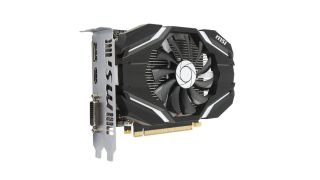
Entry level card at bargain basement prices
GPU Cores: 640 | Base Clock: 1,354MHz | Boost Clock: 1,455MHz | GFLOPS: 1,862 | Memory: 2GB GDDR5 | Memory Clock: 7.011 GT/s | Memory Bandwidth: 112GB/s
Incredibly affordable
Solid efficiency
Slight memory
Struggles at medium high settings with current games
Gaming PCs aren't cheap, and if you're an impoverished college student or just generally trying to dip your toes into the wonderful world of PC gaming but are trying to hew closer to console prices, Nvidia's bargain basement priced 1050 is your best bet. At slightly over $100, the 1050 is a fantastic entry level card that will let you play almost all modern games at modest settings.
It's also a great choice for a second PC or to tide you over until Nvidia's much-hyped RTX 2000 line launches. While the 1050 won't win any prizes for performance, the price tag makes it an attractive choice for bargain hunters.
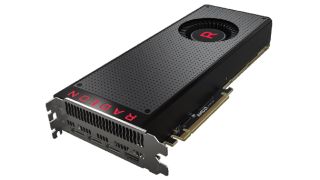
AMD's best card is a solid mid-range option
GPU Cores: 3,584 | Base Clock: 1,156MHz | Boost Clock: 1,471MHz | GFLOPS: 10,544 | Memory: 8GB HBM2 | Memory Clock: 1.6Gbps | Memory Bandwidth: 410GB/s
Good performance versus the similarly priced 1070
A better value than the Vega 64
Heat and power draw concerns
Fluctuating price
While in most testing, AMD's Vega GPU can't match Nvidia's top cards, there are environments where Vega shows its potential as a top contender (like running some DirectX 12 games and applications). The Vega sports second generation High Bandwidth Memory (HBM2), AMD's answer to the rising power consumption and form factor concerns of GDDR5, and for AMD diehards (or those vehemently anti-Nvidia), the Vega 56 is the best card for the price/performance.
At its price point the Vega is an excellent choice and performs as well as or better than the competition (the vanilla 1070 range of cards) in most tests. As a mid-range solution it's a solid choice, though concerns about heat and efficiency (as well as nagging supply issues) might be off-putting.
Some online stores give us a small cut if you buy something through one of our links. Read our affiliate policy for more info.






0 comentários:
Postar um comentário